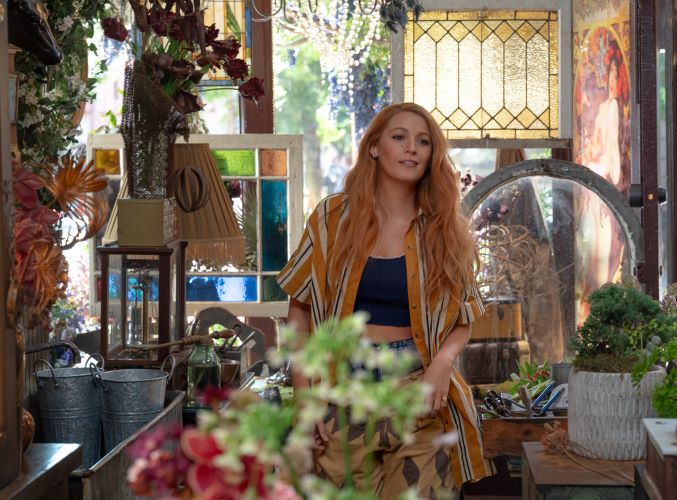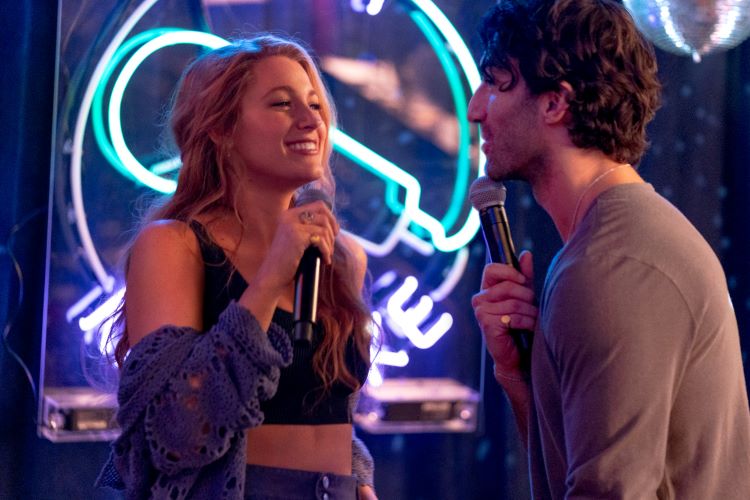
It Ends with Us is neither a soap opera nor a tear-jerker. It is a story of resilience, and the ability to change, a human drama, depicted with sensitivity, a story of hope. Directed by Justin Baldoni, with a screenplay by Christy Hall, the film is inspired by Colleen Hoover’s bestselling novel of the same name. The film appeals to the emotions, telling its story in a direct and simple manner. Although those who have read the book will know the plot in advance, that does not detract from its impact. So, I will feel more free than usual to include spoilers in this review, because it’s almost impossible to avoid them. The film’s emotional trajectory is gripping, and Blake Lively delivers a luminous performance as Lily.
It Ends with Us is a romance, a tale of friendship, and an exploration of patterns of violence and abuse. Events are seen from the perspective of its protagonist, Lily, so that the viewer experiences them as she does, through the shifting whirl of her emotions. The film’s strength is that it raises the issue of domestic violence, which, as Lily says in the film, is “not something people talk about.”
Most significant, the film explores patterns of abuse within families, its lifelong and generational impact. Lily’s past is seen in the film through a series of flashbacks, revealing her home life, growing up with a controlling, abusive father, and a mother who endured her partner’s abuse. Young Lily is portrayed by Isabela Ferrer, who has an uncanny resemblance to Blake Lively, both in her features and body language. It’s a wonderful feat of casting, directing, and performance. As a teenager, Lily befriends Atlas (Alex Neustaedter), a friendship that reveals much about their respective characters, shared experiences, and dreams.
Tense and raw after attending her father’s funeral, Lily sits on the edge of a Boston rooftop, looking over the city at night, when Ryle (Justin Baldoni) enters with a bang, kicking over a chair, because – “it’s been a day.” I think that should have been a red flag, but Lily is very vulnerable and perhaps not thinking clearly, and Ryle is very handsome. Night and the city lights make a romantic background to banter and the kind of instant intimacy that can suddenly blossom between strangers. Ryle makes it clear that he’s a player, and Lily (yay!) makes it clear that she has boundaries. And yet…
Chance brings them together again and Ryle does not give up easily. His ardent pursuit of Lily is undoubtedly flattering, everyone wants to feel wanted, yet if anyone’s paying attention (and I was paying attention) it is obvious that he is focused on himself. He begs Lily for a kiss, to get her “out of his system.” She is something he wants, she ought to give him a kiss because he wants it. What does Lily want? Well, it seems like she wants to be wanted by someone who is good-looking and rich. Which is a fine aspiration, but perhaps Ryle’s looks and money, the extent to which he fits some mythic romantic ideal, blind Lily to the less attractive aspects of his personality. So depending on the viewer’s world view, the first part of the film is either very romantic, or, if you’re like me, more like the intro to a horror movie. And yet…

Blake Lively brings the romance to vivid life. Despite my reservations, Lively conveys, with tenderness and warmth, the love that Lily feels for Ryle. So often people hearing of domestic violence situations say – why doesn’t she just leave him? For many women, the obstacle is money, it’s expensive and complicated to get up and go. Lily Bloom’s circumstances are in some respects ideal – she runs a successful business, she has a mother who does not understand her and yet is supportive, and a good friend in Alyssa (Jenny Slate delivers an outstanding performance). Lily’s advantages enable the film to focus on the complexity of emotions that Lily experiences. Ryle is not a stranger on the street who hit her, he is the man she fell in love with, the person she still loves, loves and fears. Understanding Lily’s dilemma from a visceral, emotional, perspective goes a long way to illuminating the complexities and difficulty of leaving a situation of abuse.
I’ve been watching a lot of nature documentaries lately and reflecting on the possibility that the traits that one looks for in a potential mate, that in the past, the distant past, were crucial to the survival of the species, are long overdue for revision. We, like other animals, tend to value physical strength, good looks (which might also reflect health), and success in finding food (which in humans translates to wealth). Lily is very strongly affected by Ryle’s profession as a neurosurgeon. If he was a librarian or a nurse, he might well be just as intelligent, but not anywhere near as rich, and therefore less attractive. Likewise, my feelings about his ardent pursuit – is it romantic or perhaps just overly aggressive? It Ends with Us is a compelling emotional narrative, enhanced by strong performances from Lively, Baldoni, and Slate. In its ability to engage the viewer’s feelings, the film is also an invitation to reflect on what we consider to be romantic.
It Ends with Us
Director: Justin Baldoni; Screenplay: Christy Hall; Cinematography: Barry Peterson; Editors: Oona Flaherty, Robb Sullivan; Music: Rob Simonsen, Duncan Blickenstaff; Cast: Blake Lively, Justin Baldoni, Brandon Sklenar, Jenny Slate, Isabela Ferrer, Alex Neustaedter, Hasan Minhaj, Amy Morton.





